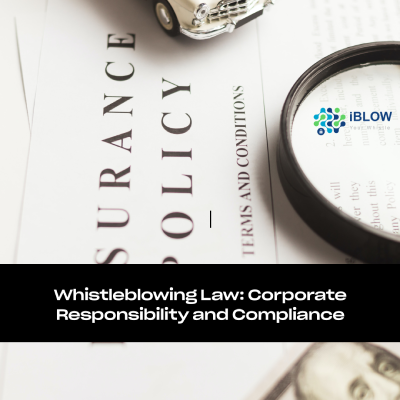Compliance with whistleblowing law, is a crucial part of corporate responsibility. It involves creating an environment where employees (as a minimum, although for best results the focus should much wider) feel safe to report fraudulent, unethical or illegal activities without fear of reprisal. Here is some information on this aspect of corporate responsibility:
Importance of Compliance with Whistleblowing Law:
-
Early Detection of Irregularities:
Whistleblower compliance allows organizations to promptly identify suspicious or illegal activity, enabling early corrective action to mitigate damage and hold those involved accountable.
-
Promoting Transparency and Ethics:
By encouraging employees to report irregularities, the company demonstrates its commitment to transparency and ethics, contributing to a more responsible organizational culture.
-
Mitigating Legal and Financial Risks:
Compliance with whistleblowing laws helps protect the organization against lawsuits and financial implications arising from unreported illegal or unethical activities.
-
Improved Reputation:
Compliance with whistleblowing laws can strengthen a company’s reputation by showing that it is committed to acting ethically and responsibly.
-
Creating a Culture of Responsibility:
By complying with whistleblowing laws, the organization promotes a culture of accountability, encouraging employees to act with integrity and report inappropriate behavior.
Whistleblowing Compliance Challenges:
-
Retaliation and Fear of Reprisals:
Employees may fear retaliation or reprisals for reporting wrongdoing, which can inhibit whistleblowing and undermine the effectiveness of the process.
-
Culture of Secrecy and Fear of Exposure:
Some employees may hesitate to report wrongdoing due to a culture of secrecy or fear of public exposure.
-
Inadequate Whistleblowing Systems:
The lack of effective whistleblowing systems or clear processes for dealing with reports can undermine the effectiveness of whistleblowing compliance.
-
Lack of Awareness and Education:
Lack of awareness and education about whistleblowing rights and procedures can lead to underutilization of available whistleblowing channels.
Ensuring compliance with whistleblowing law and addressing these challenges is essential to establishing an ethical and responsible corporate culture, promoting the trust of all stakeholders and business sustainability.
How is your implementation going? Have you started the process? How can we help?
